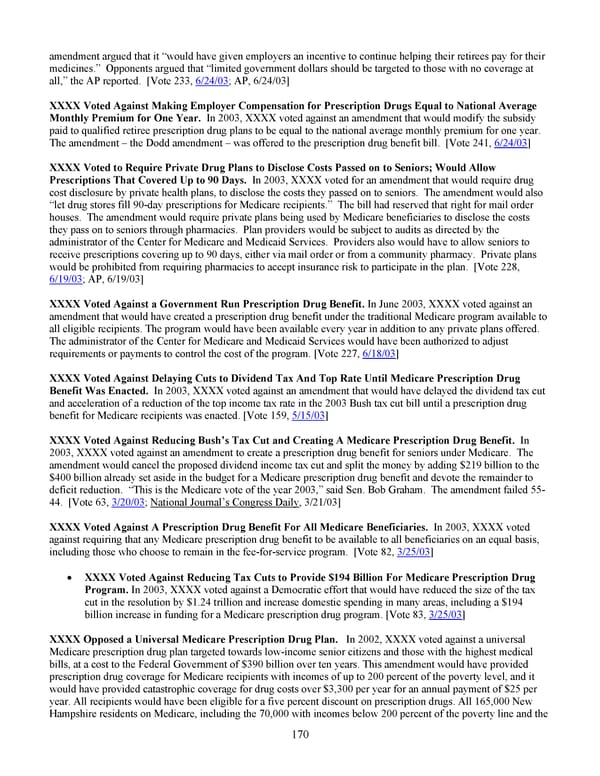amendment argued that it “would have given employers an incentive to continue helping their retirees pay for their medicines.” Opponents argued that “limited government dollars should be targeted to those with no coverage at all,” the AP reported. [Vote 233, 6/24/03; AP, 6/24/03] XXXX Voted Against Making Employer Compensation for Prescription Drugs Equal to National Average Monthly Premium for One Year. In 2003, XXXX voted against an amendment that would modify the subsidy paid to qualified retiree prescription drug plans to be equal to the national average monthly premium for one year. The amendment – the Dodd amendment – was offered to the prescription drug benefit bill. [Vote 241, 6/24/03] XXXX Voted to Require Private Drug Plans to Disclose Costs Passed on to Seniors; Would Allow Prescriptions That Covered Up to 90 Days. In 2003, XXXX voted for an amendment that would require drug cost disclosure by private health plans, to disclose the costs they passed on to seniors. The amendment would also “let drug stores fill 90-day prescriptions for Medicare recipients.” The bill had reserved that right for mail order houses. The amendment would require private plans being used by Medicare beneficiaries to disclose the costs they pass on to seniors through pharmacies. Plan providers would be subject to audits as directed by the administrator of the Center for Medicare and Medicaid Services. Providers also would have to allow seniors to receive prescriptions covering up to 90 days, either via mail order or from a community pharmacy. Private plans would be prohibited from requiring pharmacies to accept insurance risk to participate in the plan. [Vote 228, 6/19/03; AP, 6/19/03] XXXX Voted Against a Government Run Prescription Drug Benefit. In June 2003, XXXX voted against an amendment that would have created a prescription drug benefit under the traditional Medicare program available to all eligible recipients. The program would have been available every year in addition to any private plans offered. The administrator of the Center for Medicare and Medicaid Services would have been authorized to adjust requirements or payments to control the cost of the program. [Vote 227, 6/18/03] XXXX Voted Against Delaying Cuts to Dividend Tax And Top Rate Until Medicare Prescription Drug Benefit Was Enacted. In 2003, XXXX voted against an amendment that would have delayed the dividend tax cut and acceleration of a reduction of the top income tax rate in the 2003 Bush tax cut bill until a prescription drug benefit for Medicare recipients was enacted. [Vote 159, 5/15/03] XXXX Voted Against Reducing Bush’s Tax Cut and Creating A Medicare Prescription Drug Benefit. In 2003, XXXX voted against an amendment to create a prescription drug benefit for seniors under Medicare. The amendment would cancel the proposed dividend income tax cut and split the money by adding $219 billion to the $400 billion already set aside in the budget for a Medicare prescription drug benefit and devote the remainder to deficit reduction. “This is the Medicare vote of the year 2003,” said Sen. Bob Graham. The amendment failed 55- 44. [Vote 63, 3/20/03; National Journal’s Congress Daily, 3/21/03] XXXX Voted Against A Prescription Drug Benefit For All Medicare Beneficiaries. In 2003, XXXX voted against requiring that any Medicare prescription drug benefit to be available to all beneficiaries on an equal basis, including those who choose to remain in the fee-for-service program. [Vote 82, 3/25/03] XXXX Voted Against Reducing Tax Cuts to Provide $194 Billion For Medicare Prescription Drug Program. In 2003, XXXX voted against a Democratic effort that would have reduced the size of the tax cut in the resolution by $1.24 trillion and increase domestic spending in many areas, including a $194 billion increase in funding for a Medicare prescription drug program. [Vote 83, 3/25/03] XXXX Opposed a Universal Medicare Prescription Drug Plan. In 2002, XXXX voted against a universal Medicare prescription drug plan targeted towards low-income senior citizens and those with the highest medical bills, at a cost to the Federal Government of $390 billion over ten years. This amendment would have provided prescription drug coverage for Medicare recipients with incomes of up to 200 percent of the poverty level, and it would have provided catastrophic coverage for drug costs over $3,300 per year for an annual payment of $25 per year. All recipients would have been eligible for a five percent discount on prescription drugs. All 165,000 New Hampshire residents on Medicare, including the 70,000 with incomes below 200 percent of the poverty line and the 170
 HRC vote skeleton Page 183 Page 185
HRC vote skeleton Page 183 Page 185